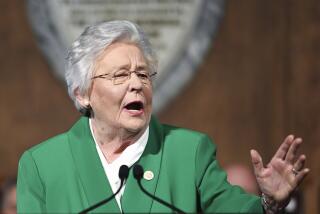Stephen P. Yokich, 66; Former President of UAW
- Share via
Stephen P. Yokich, the firebrand former leader of the United Auto Workers who was a leading force in a crippling strike against General Motors Corp. four years ago but who significantly increased benefits for union members, died of a stroke Friday in Detroit. He was 66.
Yokich had stepped down two months ago after leading the union for eight years during a time marked by vigorous growth in the country’s auto market--though not in the union’s membership. The union has about 740,000 members today, down sharply from the late 1970s, when membership was at a high of 1.5 million.
“Our union lost a powerful and eloquent leader today, and working people all over the world have lost a tireless advocate for economic and social justice,” UAW President Ron Gettelfinger said in a statement.
“Steve Yokich led our union during a period of unprecedented economic and political challenges,” Gettelfinger said. “He was extraordinarily skilled at adapting to changing times and changing circumstances, and extraordinarily committed to a core vision of social unionism: organizing the unorganized, representing our members as forcefully as possible at the bargaining table, and speaking out as strongly as possible on social issues that affect all workers and citizens, whether or not they are union members, in this country and abroad.”
Yokich was known as a gruff, relentless fighter for workers’ benefits.
He took pride in his Serbian and Irish heritage, which he liked to say prepared him well for dealing with conflict.
He didn’t mince words, once describing a General Motors executive as “yapping his chops” when talking about increasing the use of preassembled modular components, which Yokich said would reduce union jobs.
He was also suspicious of the press, frequently asking reporters who interviewed him what kind of car they owned, to see whether it was union-made.
But he was respected from outside the union for his straightforwardness and devotion to his members, and for a wry sense of humor that occasionally surfaced.
“He brought unusual dedication and skill to the job,” said Harley Shaiken, a professor of labor relations at UC Berkeley and a specialist on the UAW.
“Yokich was very direct, and wasn’t afraid to make tough decisions,” Shaiken told the Times. “He was concentrated on the fate of the union. The centerpiece of his leadership was the bargaining table and the fate of UAW members.”
The union “certainly benefited from his aggressiveness at the bargaining table,” said Daniel Kruger, a professor of industrial relations at Michigan State University.
But Yokich’s tenure was marked by diverging demands from its membership, Kruger said.
“The older workers want more job security and benefits, and the younger workers want more money,” he said, and this was one of the things that made it difficult to recruit new members.
Industry leaders praised Yokich for his honesty and perseverance.
“We have lost a respected business partner, a passionate leader in community and union relations, and most importantly, a good and honorable man,” General Motors Chairman Jack Smith said in a statement. “I value the friendship we forged and will miss his dedication to his fellow UAW members and the auto industry.”
Yokich was “a good friend and advisor,” Ford Motor Co. Chief Executive Bill Ford said. “Steve also helped his members appreciate the importance of focusing on the business. He made quality everyone’s top priority.”
As UAW president, Yokich served on the board of DaimlerChrysler AG, formed by Daimler-Benz’s acquisition of the former Chrysler Corp.
“We knew him as a tremendous leader and a passionate advocate for working men and women everywhere,” said Dieter Zetsche, chief executive of DaimlerChrysler’s Chrysler Group. “He could be a tough adversary but, at the same time, a good friend--and to gracefully combine those two qualities is truly a hallmark of greatness,” Zetsche said.
Yokich was born Aug. 20, 1935, six days before the UAW was founded.
His parents were both trade activists, and young Stephen was taken on his first picket line when he was 22 months old.
He joined the UAW in 1956 when he was hired as a tool and die maker apprentice at Heidrich Tool and Die Co. in Oak Park, Mich.
After rising through the union ranks, he was elected UAW vice president in 1980 and was reelected to four additional three-year terms.
In 1995, he was elected UAW president, and reelected in 1998.
He led successful efforts to expand benefits for members, including cost-of-living gains for retirees, health-care improvements, tuition assistance for UAW dependents, improved cost-of-living allowances and pension formulas, and a paid Election Day holiday.
He was a central force in the 1998 strike, partly over bargaining issues but also “to send an unmistakable message to GM and the industry as to how serious they were on the issues of globalization and outsourcing” auto production to non-union workers, UC Berkeley’s Shaiken said.
Yokich unsuccessfully tried to increase UAW membership through organizing drives at Japanese-and German-run “transplant” factories. Toyota, Nissan and Mercedes-Benz turned away overtures by the UAW, sometimes by 2-to-1 votes.
But “despite the enormous pressures which have crippled some manufacturing unions, the UAW remains strong at the end of his tenure, which is no small feat,” Shaiken said.
Yokich’s survivors include his mother, Julia; his wife, Tekla; his daughter, Tracey Yokich; his son, Stephen A. Yokich; and a grandson.
The UAW will hold a public visitation Monday in Detroit. A private family memorial service will be held later.






